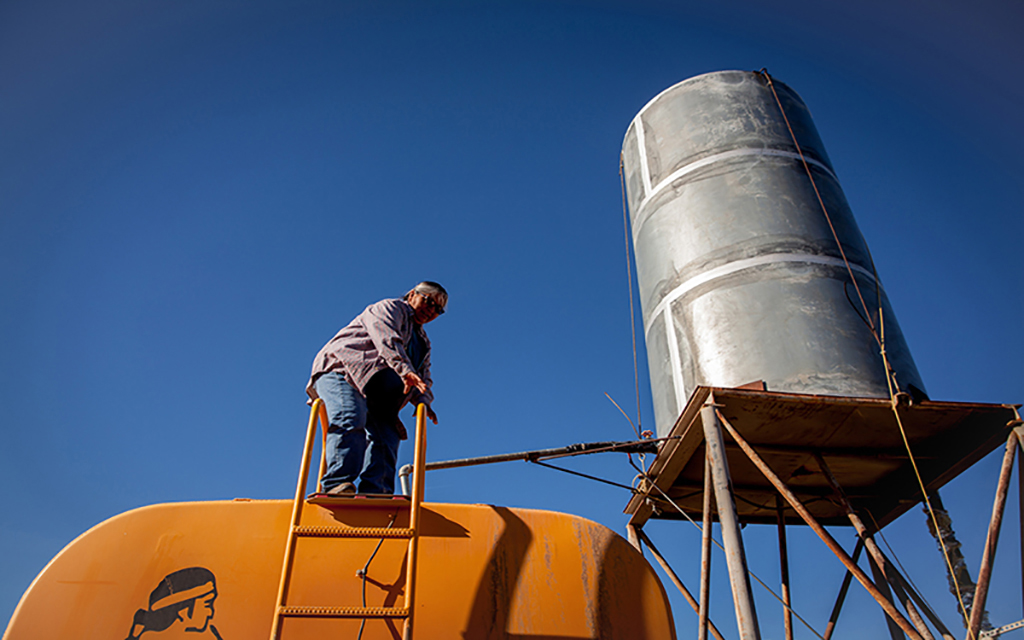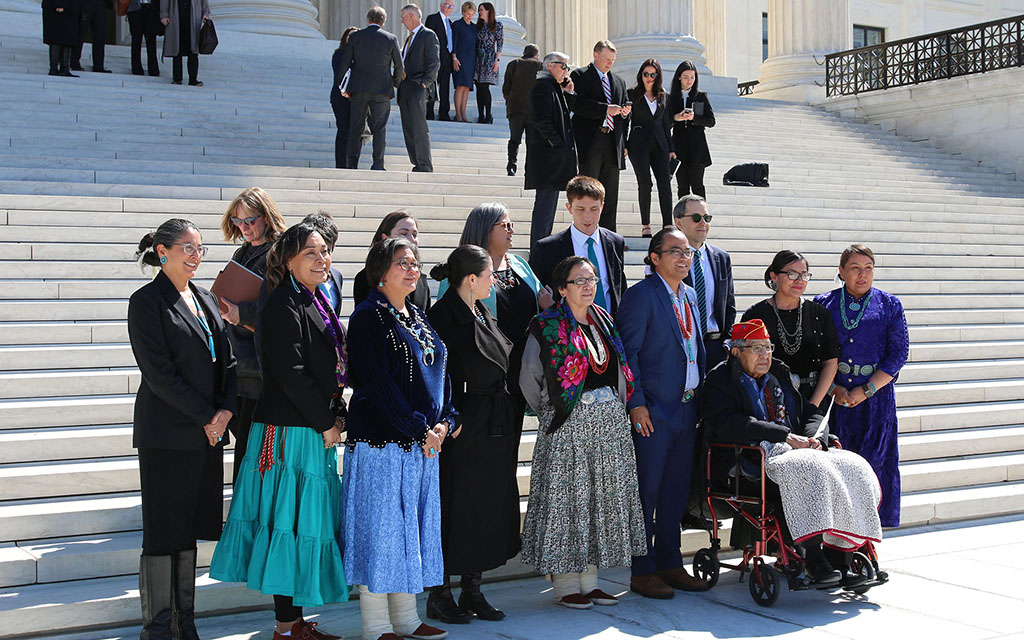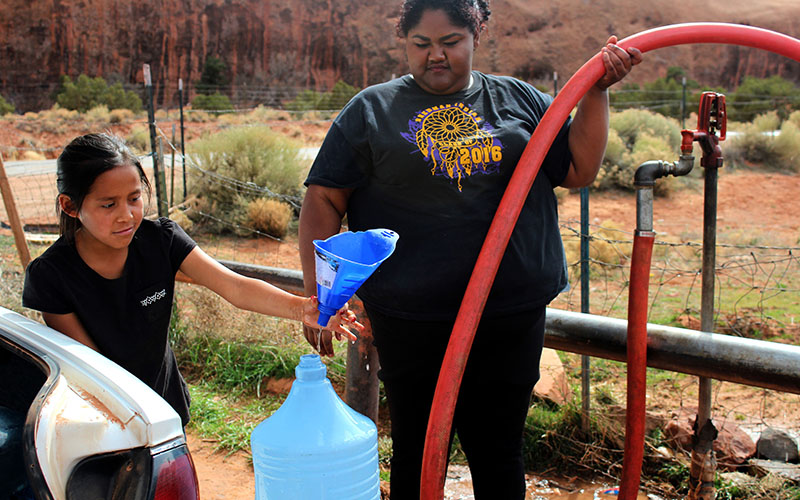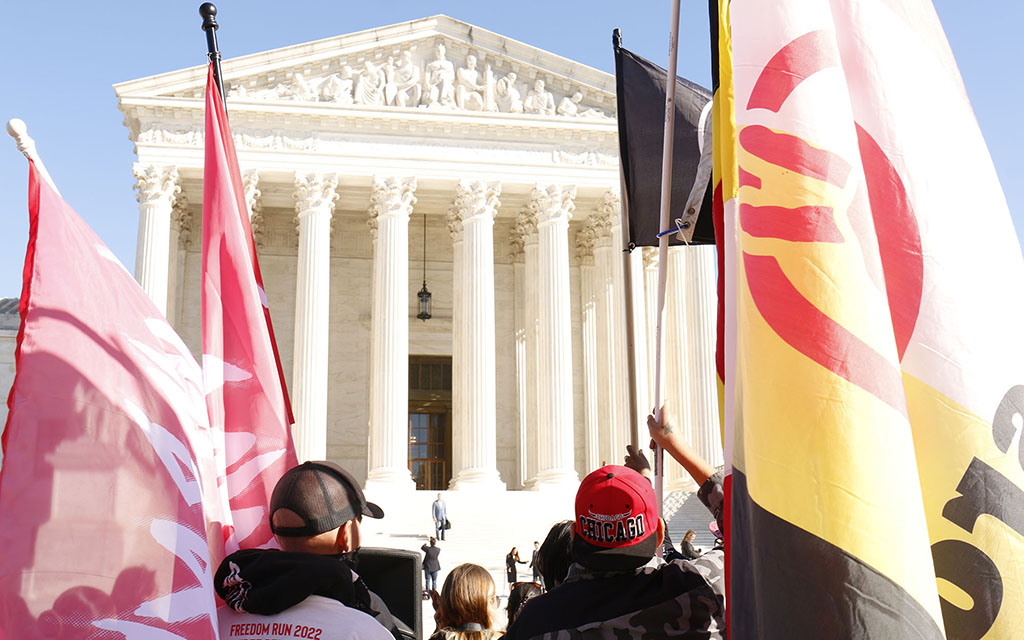
For many on the Navajo Nation, water needs to be trucked into homes that do no have running water. In this June 2022k photo, Darlene Arviso fills her truck with well water from the St. Bonaventure Indian Mission and School for delivery to residents on the reservation, a daily chore for nine years. (File photo by Maria Esquinca/News21)
WASHINGTON – A divided Supreme Court ruled Thursday that the federal government is not required to take “affirmative steps” to guarantee water for the Navajo Nation beyond the water rights that were granted in an 1868 treaty.
The 5-4 ruling said that if the court agreed with the Navajo, it could lead to a situation where the government is forced to build “pipelines, pumps, wells or other water infrastructure” that were not specified in the treaty.
“It is not the Judiciary’s role to rewrite and update this 155-year-old treaty,” Justice Brett Kavanaugh wrote for the majority. “Rather, Congress and the President may enact – and often have enacted – laws to assist the citizens of the western United States, including the Navajos, with their water needs.”
Justice Neil Gorsuch disagreed. In a dissenting opinion, he said that the tribe is looking for nothing more than sorting out water rights after decades of trying unsuccessfully to get an answer – efforts he said would be “familiar to any American who has spent time at the Department of Motor Vehicles.”
“The Navajo have waited patiently for someone, anyone, to help them, only to be told (repeatedly) that they have been standing in the wrong line and must try another,” Gorsuch wrote in his dissent, which was joined by Justices Elena Kagan, Sonia Sotomayor and Ketanji Brown Jackson.

Navajo President Buu Nygren stands behind Navajo Code Talker Peter MacDonald, in wheelchair, outside the Supreme Court, in March after justices heard the tribe’s lawsuit over the tribe’s water rights. (File photo by Alexis Waiss/Cronkite News)
Justin Ahasteen, executive director of the Navajo Nation’s Washington Office, said Gorsuch hit the nail on the head.
“We weren’t asking for the affirmative steps,” Ahasteen said. “We were asking for the decision to be remanded back down to the court so that we could actually litigate the matter.”
But Rita Maguire, the lead attorney for the Arizona Department of Water Resources, said “I am thrilled, the state of Arizona is thrilled” by the decision.
“It’s a clear decisive ruling out of the court that there can be no breach of trust to an Indian tribe without expressed language in a treaty or by statute,” she said.
Maguire thinks “the Navajo need to focus on the water supplies that they have.” Kavanaugh noted that the 17 million acre Navajo reservation is bordered by the Colorado, Little Colorado and San Juan rivers and that the tribe has access to “water from rivers, tributaries, springs, lakes and aquifers.”
“So they’re not without water,” Maguire said.
Kavanaugh acknowledged that even though the tribe has the right to water from various sources on the reservation, the ongoing drought means the Navajos “face the same water scarcity problem that many in the United States face.” He also noted that the government has “secured hundreds of thousands of acre-feet of water and authorized billions of dollars for water infrastructure on the Navajo Reservation.”
That was not enough for the Navajo, Kavanaugh said, who claimed the government was not living up to its obligations under the 1868 treaty that created the reservation. But he said the treaty makes no such obligation.
“Nothing in the 1868 treaty establishes a conventional trust relationship with respect to water. And it is unsurprising that a treaty enacted in 1868 did not provide for all of the Navajos’ current needs 155 years later,” Kavanaugh wrote.
Gorsuch said the tribe’s lawsuit is “not about compelling the federal government to take ‘affirmative steps to secure water for the Navajo.'”
“The Navajo have a simple ask: They want the United States to identify the water rights it holds for them,” Gorsuch wrote, and to step in and fix the problem only if it determines it has misappropriated the tribe’s water rights.
Gorsuch said if there was a silver lining in Thursday’s decision, it is that the court did not block other avenues the Navajo Nation might pursue as they fight for their water rights.
“The Navajo have tried it all,” Gorsuch wrote. “At each turn, they have received the same answer: ‘Try again.’”
That’s what they plan to do. Ahasteen said the Navajo Nation is actively pursuing different methods and that “nothing is off the table.”
Ahasteen said the tribe will continue to hurt because of this decision.
“I think the state of Arizona doesn’t truly recognize the need (for water rights) for the Navajo Nation,” Ahasteen said. “We’re hopeful that the state of Arizona will actually recognize that there is a need for water and that by restricting access to this and by drawing out this process, it continues to impact our people on a day-to-day basis.”

The average Navajo uses 7 gallons of water a day for household needs – a 10th of average U.S. consumption, cout documents said. (File photo by Devon Cordell/ Cronkite News)
The Interior Department said in an emailed statement that it is “committed to upholding its trust and treaty obligations to Tribes, as well as to ensuring that water rights for Colorado River users are fulfilled according to the law.”
The Arizona Department of Water Resources said it was grateful for the court’s ruling. It said in an emailed statement that the state’s primary concern in the case has been management of the Lower Colorado River system through “drought, climate change and historical overuse… Today’s opinion allows the Secretary to do just that.”
Ahasteen said he hopes that the state “does recognize that moving forward that they can’t hold water hostage.” Navajo Nation Council Speaker Crystalyne Curley said in a press release that the tribe will not give up.
“Today’s ruling will not deter the Navajo Nation from securing the water that our ancestors sacrificed and fought for — our right to life and the livelihood of future generations,” she said in the statement.


